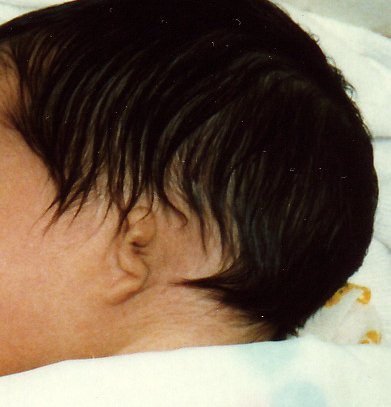I’ve formally been rooted in medtech for well over 10 years. As a high school junior, I declared biomedical engineering as my major of choice on my college application, and I never changed it. I’m blessed that I work for a medical device company and write about medical technology on the side. I’ve had the opportunity to speak about the life-changing potential of medical technology and visit numerous countries to see what they’re developing.
In reflecting back on how I got to where I am, there’s a few reasons that come to mind. First, I come from an extended family of health care workers, including orthodontists and dentists, pharmacists, radiologists, and nurses. I think it’s always been perceived as a stable and meaningful career.
But most significantly, I think an early exposure to medical technology played a role.
I was born with a condition called an atresia, where my left ear looked somewhat like a slug. Yup, that’s my left ear in the photo. Thanks to medical technology and the talents of world-renown, now-retired surgeon Dr. Burt Brent, I was given the structure of a new left ear some 27 years ago. And three years ago, another world-renown surgeon, Dr. Joseph Roberson, enhanced Dr. Brent’s handiwork by creating an ear canal and restoring partial hearing to my ear!

Ever since I had the atresia surgically repaired at age five, I’ve been fascinated with the field of medical science. I certainly had the math and science chops to become a computer or electrical engineer. But instead of playing a role in helping develop the world’s most advanced computer (for a short while before something better is developed), I wanted to leave a legacy having helped a blind person restore of semblance of sight, or mobility to someone who is physically handicapped.
I get to look at my ear every day in the mirror and praise God for the knowledge He has given mankind to make life more enjoyable in Him through medicine.
Perhaps that’s why I wanted to be a biomedical engineer when I grew up.
